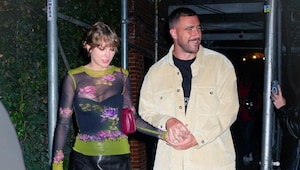Why Seduction Isn’t a Dirty Word
In times of instant gratification, the lines between seduction and harassment are blurring fast. We help you differentiate, and re-discover the joys of true seduction.


Esther Perel is a sex and relationship therapist, New York Times best-selling author, popular TED speaker, and the host of the hit podcast Where Should We Begin? Her latest project is Rekindling Desire 2.0, an e-course for couples looking to keep their spark alive. Learn more at EstherPerel.com or by following @EstherPerelOfficial on Instagram.
Thanks to a long overdue cultural reckoning, our society is now laser-focused on how women are treated in all aspects of life. Much has been said about sexual harassment in the workplace, but less discussed is what’s appropriate outside professional settings. This has left many people confused about the boundaries between seduction and harassment on a romantic level. When it comes to flirting, what’s considered an acceptable come-on, and what’s crossing a major line?
The shortest, most basic answer is this: if you feel complimented, you’re being seduced. If you feel degraded, you’re being harassed. Of course, real life isn’t always so black-and-white, and there can be times—say, at a bar, party, or even online—when the distinction may not feel so clear. Perhaps you can’t fully decide whether you feel flattered or offended, or both, by how someone has approached you. In those cases, use the following guide to process your emotions and proceed accordingly.
Recognising Seduction
Seduction is a beautiful form of flirtation that implies an appreciation and respect for you, the person being seduced. It can make you feel praised, wanted and enchanted, and because it hints at the possibility of a consensual relationship or sexual experience, it can also rouse your imagination about the exciting romantic potential ahead.
When acting decently, a seducer knows that you have the power to say no to their advances at any time, and they will respect that decision. So, if someone is offering to buy you a drink, or suggests that the two of you have dinner together sometime, they’re aware that they may not succeed, and won’t push you to reconsider or demean you if you reject them. They tried and missed, but it’s not a statement about
them or you.
In this way, seduction is like a dance. In order for it to be considered exciting and sexy, both parties must be willing participants and gradually be more and more drawn to each other as they go along.
Navigating Blurred Lines
True seduction is a slow process—one that’s been lost in recent years because of so-called pickup artists who will try to lure a partner in the quickest way possible. Even well-meaning people fall into this trap, because our culture has become all about instant gratification. This means that the romantic aspects of seduction are often cheapened down to whether or not you score, or a need-to-know-right-now game of ‘Is this going to lead to something or not?’.
As a result, many women today are rightfully skeptical when they are being flirted with. This newer, sped-up seduction can leave them uncomfortable with the way they are being pursued, and they might question whether they are, in fact, being seduced...or harassed.
Spotting HARASSMENT
At its core, harassment is about power. It’s a form of erotic sadism that’s deliberately -orchestrated, objectifying, and unrelenting. The person making the advances aims to degrade or conquer. That can leave the recipient feeling intimidated, threatened, trapped, or, if they try to stop it, like they’ll be punished.
Unlike seducers, who are pursuing a genuine romantic interest, most harassers act out of shame and rage that have been stored inside them, typically because they have been romantically or socially shut down over and over. (That’s compounded by the fact that, for many men, the fear of rejection is one of their greatest vulnerabilities). Although it’s not an excuse, nor is it right, some will deal with this pent-up anger by harassing others, especially women, as a kind of hostile revenge. This will feel like they’re shaming you—an emotion that true seduction will typically never evoke.
If you’re still unsure, remember this: if you have to say no twice to someone who’s -hitting on you, that’s harassment. If they don’t walk away when you say, ‘I’m not interested’, or they send you messages online like, ‘What’s wrong with you?’, if you don’t respond, that is harassment.
Making your Decision
If you’re comfortable or excited about a person’s advances, you can flirt back and see where it goes. But if you’re troubled in any way, you can respond with, ‘Leave me alone’, or physically step away. If you worry that may incite anger or a dangerous situation, try ‘Thanks, but I’m not interested’, which may prompt the harasser to retreat with their ego intact. That may sound controversial, but it may also keep you safe.
Love Quiz:
Is your seducing style on point or offensive?
1. If you’re flirtatious with someone and they seem uneasy, do you try a different tactic?
( ) Yes ( ) No
2. Do you send -dating-app matches multiple messages, even if they haven’t yet responded?
( ) Yes ( ) No
3. In your opinion, is taking a slow approach an outdated way to get together with someone?
( ) Yes ( ) No
If you answered mostly YES, you may be making moves that leave others feeling -uncomfortable. Next time, pay closer attention. If someone declines your advances, take a hint and bow out.
If you answered mostly No, then you are respecting other people’s boundaries. Continue to flirt with romantic prospects in ways that pique both your interests.
“If you feel complimented, you are being seduced.
If you feel degraded, you are being harassed.”
more from Relationships

Choremance is the new dating trend making everyday errands feel romantic

All the cobalt blue essentials you need for your 2026 wardrobe revamp

How to break your screen addiction without going off the grid

Beauty sticks are everywhere right now and these are the products worth trying

So many truly wild things happened during the 'Emily in Paris' season 5 finale

Fun cosy socks you should invest in while winter is still around

Every couple should fight (Taylor and Travis included)

How ‘The Housemaid’ movie stacks up to the book

Emily is heading back to Paris for season six but is this where we say goodbye?

Keeping the camera on or off: What’s the right way to go about professional meetings?
